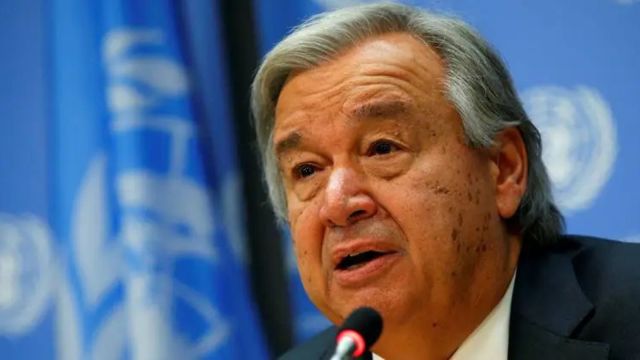Ahead of a UN Security Council meeting convened at the request of Pakistan, UN Secretary General Antonio Guterres called for “maximum restraint” and said a “military solution is no solution”. Referring to the Pahalgam terror attack, he underlined that “targeting civilians is unacceptable”.
“I deeply respect and am profoundly grateful to the Government and people of both countries — and their significant contributions to the work of the United Nations, not least UN peacekeeping. And so it pains me to see relations reaching a boiling point,” he said.

“I understand the raw feelings following the awful terror attack in Pahalgam on 22 April. I once again strongly condemn that attack and extend my condolences to the families of the victims. Targeting civilians is unacceptable — and those responsible must be brought to justice through credible and lawful means,” Guterres said.
Story continues below this ad
He then cautioned against any military response: “It is also essential — especially at this critical hour — to avoid a military confrontation that could easily spin out of control. Now is the time for maximum restraint and stepping back from the brink. That has been my message in my ongoing outreach with both countries. Make no mistake: A military solution is no solution.”
“And I offer my good offices to both governments in the service of peace. The United Nations stands ready to support any initiative that promotes de-escalation, diplomacy, and a renewed commitment to peace,” he said.
His remarks came as the UNSC prepared to hold closed consultations Monday afternoon in New York (early Tuesday India time).
Pakistan is a non-permanent member of the 15-nation Security Council, which is being presided over by Greece this month.
Story continues below this ad
A non-permanent member can request for a meeting, and the member country, which is the president of the UNSC for the month, has to take a call on allowing the issue to be discussed. Normally, when a country at the UNSC calls for a meeting, the President usually allows it.
A closed door meeting is supposed to be an off-the-record meeting, with no statements or resolutions in that case. After the August 2019 meeting, which was called by China at Pakistan’s behest, there was no UNSC statement at that time.
Apart from the five veto-wielding permanent members — China, France, Russia, UK and US — the 10 non-permanent members in the Council currently are Algeria, Denmark, Greece, Guyana, Pakistan, Panama, South Korea, Sierra Leone, Slovenia and Somalia.
Unlike 2019, when India was at the UNSC as a non-permanent member, Pakistan is at the Security Council in New York this time. This means that they have the voice at the table, while India is not present in the room.
Story continues below this ad
So, India will be depending on other friendly countries to present Delhi’s views and will also brief India on what transpired at the meeting.
While Indian diplomats in New York are hard at work to lobby with the members at the UNSC, External Affairs Minister S Jaishankar has spoken with Guterres, Russian Foreign Minister Sergey Lavrov, US Secretary of State Marco Rubio, UK Foreign Secretary David Lammy, French Foreign Minister Jean-Noel Barrot and South Korean Foreign Minister Cho Tae-yul, and other non-permanent members. He has not spoken to the Pakistan and Chinese Foreign Ministers.
In his calls, Jaishankar underlined his message that the Pahalgam terror attack’s “perpetrators, backers and planners must be brought to justice”. – With PTI in New York









